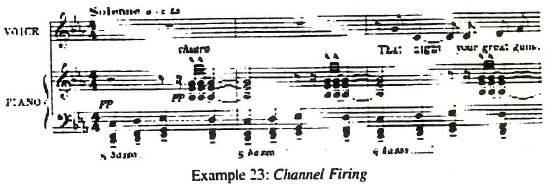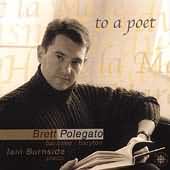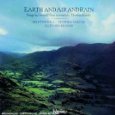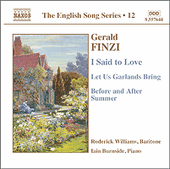Channel Firing
Poet: Thomas Hardy
Date of poem:
Publication date:
Publisher:
Collection:
History of Poem:
Poem
Channel Firing |
||
|---|---|---|
| 1 | That night your great guns, unawares, | |
| 2 | Shook all our coffins as we lay, | |
| 3 | And broke the channel window-squares, | |
| 4 | We thought it was the Judgement-day | |
| 5 | And sat upright. While drearisome | |
| 6 | Arose the howl of wakened hounds: | |
| 7 | the mouse let fall the altar-crumb, | |
| 8 | The worms drew back into the mounds, | |
| 9 | The glebe cow drooled. Till God called, 'No; | |
| 10 | It's gunnery practice out at sea | |
| 11 | Just as before you went below; | |
| 12 | The world is as it used to be: | |
| 13 | 'All nations striving strong to make | |
| 14 | Red war yet redder. Mad as hatters | |
| 15 | They do no more for Christes sake | |
| 16 | Than you who are helpless in such matters. | |
| 17 | 'That this is not the judgment-hour | |
| 18 | For some of them's a blessed thing, | |
| 19 | For it it were they'd have to scour | |
| 20 | Hell's floor for so much threatening. . . . | |
| 21 | 'Ha, ha. It will be warmer when | |
| 22 | I blow the trumpet (if indeed | |
| 23 | I ever do; for you are men, | |
| 24 | And rest eternal sorely need).' | |
| 25 | So down we lay again. 'I wonder, | |
| 26 | Will the world ever saner be,' | |
| 27 | Said one, 'than when He sent us under | |
| 28 | In our indifferent century!' | |
| 29 | And many a skeleton shook his head. | |
| 30 | 'Instead of preaching forty year,' | |
| 31 | My neighbour Parson Thirdly said, | |
| 32 | 'I wish I had stuck to pipes and beer.' | |
| 33 | Again the guns disturbed the hour, | |
| 34 | roaring their readiness to avenge, | |
| 35 | As far inland as Stourton Tower, | |
| 36 | And Camelot, and starlit Stonehenge. | |
(Hardy, 305-6) |
||
Content/Meaning of the Poem:
Speaker:
Setting:
Purpose:
Idea or theme:
Style:
Form:
Synthesis:
Published comments about the poem:
✦✼✦✼✦✼✦✼✦✼✦✼✦✼✦✼✦✼✦✼✦✼✦✼✦✼✦✼✦✼✦✼✦✼✦
✦✼✦✼✦✼✦✼✦✼✦✼✦✼✦✼✦✼✦✼✦✼✦✼✦✼✦✼✦✼✦✼✦✼✦
Musical Analysis
Composition date:
Publication date:
Publisher: Boosey & Hawkes - Distributed by Hal Leonard Corporation
Tonality:
Transposition:
Duration:
Meter:
Tempo:
Form:
Rhythm:
Melody:
Texture:
Vocal Range:
Tessitura:
Dynamic Range:
Accompaniment:
Published comments about the music:
Pedagogical Considerations for Voice Students and Instructors:
✦✼✦✼✦✼✦✼✦✼✦✼✦✼✦✼✦✼✦✼✦✼✦✼✦✼✦✼✦✼✦✼✦✼✦
✦✼✦✼✦✼✦✼✦✼✦✼✦✼✦✼✦✼✦✼✦✼✦✼✦✼✦✼✦✼✦✼✦✼✦
| Pitch Analysis | ||||||
|---|---|---|---|---|---|---|
| pitch | stanza 1 |
stanza 2 |
stanza 3 |
stanza 4 |
total | |
highest |
A |
|||||
G |
||||||
F |
||||||
E |
||||||
D |
||||||
middle C |
||||||
B |
||||||
A |
||||||
G |
||||||
F |
||||||
lowest |
E |
|||||
| Rhythm Duration Analysis of Vocal Line | |||||
|---|---|---|---|---|---|
| stanza 1 | stanza 2 | stanza 3 | stanza 4 | total | |
16th note |
|||||
8th note |
|||||
dotted 8th |
|||||
quarter note |
|||||
dotted quarter |
|||||
triplet |
|||||
half note |
|||||
dotted half |
|||||
stanza total |
|||||
✦✼✦✼✦✼✦✼✦✼✦✼✦✼✦✼✦✼✦✼✦✼✦✼✦✼✦✼✦✼✦✼✦✼✦
Audio Recordings
To a Poet |
|
|
|
The Songs of Gerald Finzi to Words by Thomas Hardy
|
|
|
|
Gerald Finzi |
|
|
|
The English Song Series - 12 |
|
|
|
The following are comments by Chia-wei Lee regarding the song Channel Firing. Dr. Lee extended permission to post this excerpt from his dissertation on February 16, 2012. His dissertation dated 2003, is entitled:
A Performance Study of Gerald Finzi's Song Cycle
"Before and After Summer"
This excerpt begins on page 77 and concludes on page 83.
The preceding were comments by Chia-wei Lee regarding the song Channel Firing. Dr. Lee extended permission to post this excerpt from his dissertation on February 16th, 2012. His dissertation dated 2003, is entitled:
A Performance Study of Gerald Finzi's Song Cycle
"Before and After Summer"
The excerpt began on page 77 and concluded pn page 83.
The following is an analysis of **** by Gerhardus Daniël Van der Watt. Dr. Van der Watt extended permission to post this excerpt from his dissertation on October 8th, 2010. His dissertation dated November 1996, is entitled:
The Songs of Gerald Finzi (1901-1956) To Poems by Thomas Hardy
This excerpt comes from Volume II and begins on page *** and concludes on page ***. To view the methodology used within Dr. Van der Watt's dissertation please refer to: Methodology - Van der Watt.
1. Poet
Specific background concerning poem:
2. Poem
Setting
1. Timbre
VOICE TYPE/RANGE
2. Duration
METRE
Rhythmic motifs
Rhythmic activity vs. Rhythmic stagnation
Rhythmically perceptive, erroneous and interesting settings
Lengthening of voiced consonants
3. Pitch
Intervals: Distance distribution
Interval |
Upwards |
Downwards |
Unison |
||
Second |
||
Third |
||
Fourth |
||
Fifth |
||
Sixth |
||
Seventh |
Interval |
Bar no. |
Word/s |
Reason/s |
Melodic curve
Climaxes
System no. |
Pitch |
Word |
Phrase lengths
System no. |
From - To |
Suggested reason/s |
Chromaticism
HARMONY AND COUNTERPOINT
Non-harmonic tones
Harmonic devices
Counterpoint
FREQUENCY
RANGE
VARIETY
DYNAMIC ACCENTS
No. of parts |
No. of beats |
Percentage |
2 parts |
||
3 parts |
||
4 parts |
||
5 parts |
||
6 parts |
7. Mood and atmosphere
General comment on style
Unpublished Analysis Excerpts
The following is an analysis of Channel Firing by Curtis Alan Scheib. Dr. Scheib extended permission to post this excerpt from his dissertation on February 17th, 2012. His dissertation dated 1999, is entitled:
Gerald Finzi's Songs For Baritone On Texts By Thomas Hardy: An Historical And Literary Analysis And Its Effect On Their Interpretation
This excerpt begins on page fifty-eight and concludes on page sixty.
Channel Firing |
||
|---|---|---|
| 1 | That night your great guns, unawares, | |
| 2 | Shook all our coffins as we lay, | |
| 3 | And broke the channel window-squares, | |
| 4 | We thought it was the Judgement-day | |
| 5 | And sat upright. While drearisome | |
| 6 | Arose the howl of wakened hounds: | |
| 7 | the mouse let fall the altar-crumb, | |
| 8 | The worms drew back into the mounds, | |
| 9 | The glebe cow drooled. Till God called, 'No; | |
| 10 | It's gunnery practice out at sea | |
| 11 | Just as before you went below; | |
| 12 | The world is as it used to be: | |
| 13 | 'All nations striving strong to make | |
| 14 | Red war yet redder. Mad as hatters | |
| 15 | They do no more for Christes sake | |
| 16 | Than you who are helpless in such matters. | |
| 17 | 'That this is not the judgment-hour | |
| 18 | For some of them's a blessed thing, | |
| 19 | For if it were they'd have to scour | |
| 20 | Hell's floor for so much threatening. . . . | |
| 21 | 'Ha, ha. It will be warmer when | |
| 22 | I blow the trumpet (if indeed | |
| 23 | I ever do; for you are men, | |
| 24 | And rest eternal sorely need).' | |
| 25 | So down we lay again. 'I wonder, | |
| 26 | Will the world ever saner be,' | |
| 27 | Said one, 'than when He sent us under | |
| 28 | In our indifferent century!' | |
| 29 | And many a skeleton shook his head. | |
| 30 | 'Instead of preaching forty year,' | |
| 31 | My neighbour Parson Thirdly said, | |
| 32 | 'I wish I had stuck to pipes and beer.' | |
| 33 | Again the guns disturbed the hour, | |
| 34 | Roaring their readiness to avenge, | |
| 35 | As far inland as Stourton Tower, | |
| 36 | And Camelot, and starlit Stonehenge. | |
(Hardy, 305-6) |
||
There are many elements at work in this poem. Hardy manipulates time here, past, present and future all blurring in a conversation from the grave. There is also a strong sense of Hardy's antagonism toward religion, the parson commenting on the uselessness of sermons and God doubting that the trumpet announcing the judgement day will ever be blown. It is a complex grouping of ideas which Finzi matches with a setting that is his longest and one of his most effective. It begins with a murky introduction in C minor, the gunfire of war, which is mistaken for the judgement day by the graveyard occupants (example 23).

This motive acts as a ritornello of sorts, returning two more times, the third time ferociously as the guns roar their readiness "to avenge." The song as a whole has an almost symphonic feel, the sections or "movements" overlapping one another without resolution, much as Hardy's manipulation of time. The vocal line maintains Finzi's one syllable - one note edict throughout, the lines largely shaped by the declamative needs of the text. The piano is given much of the descriptive material; the movement of the worms, the falling altar crumb, the frantic image of war, the lying back down of the dead into the grave, the scherzo of the dancing skeletons and the final roaring of the guns (examples 24 and 25).

The symphonic element comes from the strength and variety of the sections, though it is not a symphony in the strict sense of form by any means. Finzi manipulates, or chooses to disregard, form in the same way that hardy manipulates time and ideas. His aim, as always, was the expression of the poet's voice.
The preceding was an analysis of Channel Firing by Curtis Alan Scheib. Dr. Scheib extended permission to post this excerpt from his dissertation on February 17th, 2012. His dissertation dated 1999, is entitled:
Gerald Finzi's Songs For Baritone On Texts By Thomas Hardy: An Historical And Literary Analysis And Its Effect On Their Interpretation
The excerpt began on page fifty-eight and concluded on page sixty.




